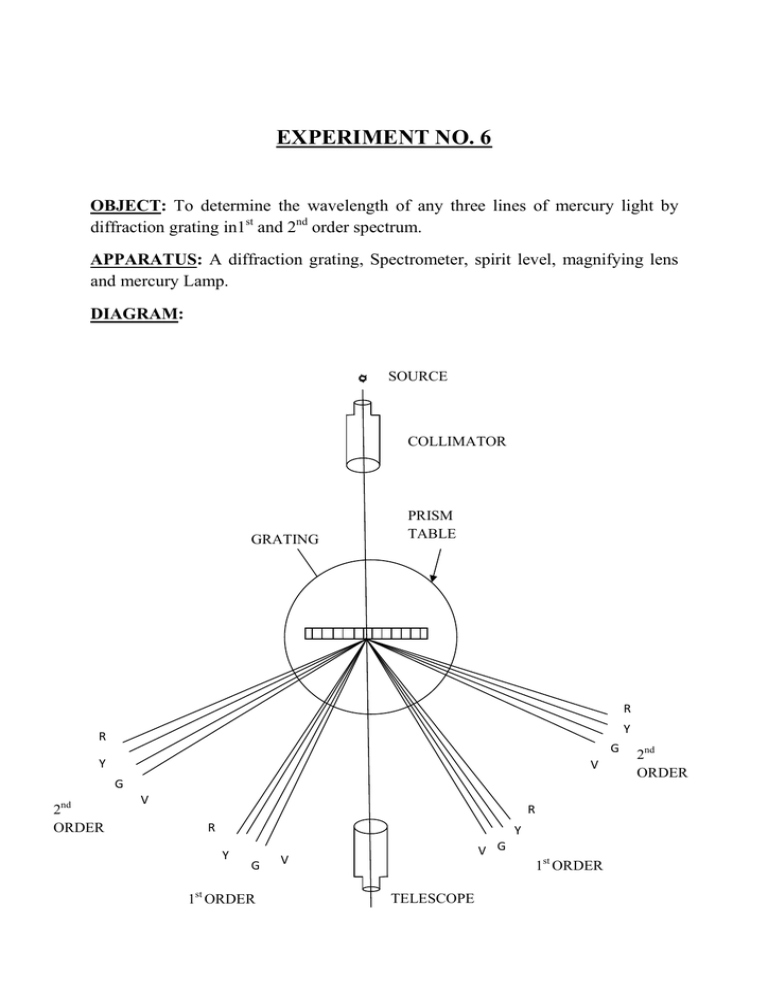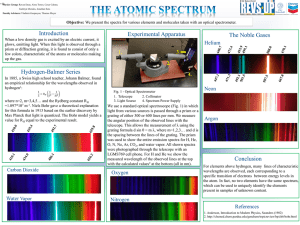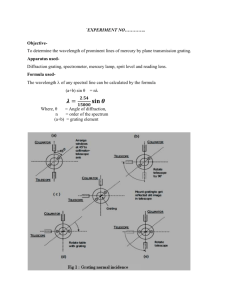Mercury Light Wavelength Experiment: Diffraction Grating
advertisement

EXPERIMENT NO. 6
OBJECT: To determine the wavelength of any three lines of mercury light by
diffraction grating in1st and 2nd order spectrum.
APPARATUS: A diffraction grating, Spectrometer, spirit level, magnifying lens
and mercury Lamp.
DIAGRAM:
SOURCE
COLLIMATOR
GRATING
PRISM
TABLE
R
Y
R
G
Y
V
G
2nd
ORDER
V
R
R
Y
V G
Y
G
1st ORDER
V
1st ORDER
TELESCOPE
2nd
ORDER
THEORY AND FORMULA: The wavelength λ of any line is given by
λ=
where (a+b) =
cm.
cm is the grating element.
N = number of lines per inch. (N = 15,000 lines per inch)
ϴ = angle of diffraction
n = order of spectrum
PROCEDURE:
# Check that both cross wire are present and are at right angles to each other.
# following adjustments are made before performing the experiment.
1. Level the prism table and do all adjustments of spectrometer for parallel
light rays.
2. Adjust windows of the vernier so that they are about 450 /1350 to the
collimator.
3. Adjust the height of the prism table so that light falls on the central position
of the grating.
4. Make grating normal to the axis of collimator by following method:
5. All observations should be recorded in degrees and minutes (L.C. of vernier
is 1 minute)
6. Without placing the grating, bring the direct image of slit on vertical cross
wire of the telescope and note any one of the vernier.
7. Rotate the telescope through 900 and fix it (note the reading).
8. Mount the grating on the prism table and do not loosen its upper screw
during the experiment after the height has been adjusted.
9. Unscrew the lower most screw and rotate the vernier table until the reflected
image from the diffraction grating coincide with the vertical cross wire of
the telescope, note any of the vernier reading. In this position grating is at
450 to incident light.
10. Turn the prism table to exactly 450 /1350 (after noting in the vernier table) so
that grating is exactly normal to collimator.
# Determination of angle 2ϴ :
1. Rotate the telescope to the left of direct image and adjust the vertical
cross wire for 1st order (in different spectral lines violet, green and yellow
I and II). Note the reading of both the verniers.
2. Rotate the telescope further to obtain the 2nd order spectrum and again
adjust the vertical cross wire on different spectral lines and note the
readings.
3. Now rotate the telescope to the right of the direct image and repeat the
procedure at the steps 4 and 5.
4. Take the difference of corresponding V1 and V2 on the left and right for
the same colour and find mean as noted in observation table.
OBSERVATION:
Order of
spectrum
Colour of
light
Vernier
no.
Spectrum on left side
Spectrum on right side
M.S.
M.S.
V.S.
Total (a)
(in degrees)
V.S.
Difference
Total(a)
(in degrees)
ϴ
{2ϴ} (a-b)
(in degrees)
Violet
FIRST
Green
Yellow
Violet
SECOND
Green
Yellow
V1
V2
V1
V2
V1
V2
V1
V2
V1
V2
V1
V2
CALCULATIONS:
(a+b) =
cm
λ=
First order :
λv=
A0 , λG =
A0 , λY =
A0
A0, λY =
A0
Second order: λ=
λv=
A0, λG =
RESULT: The wavelengths are given in the table.
Colour of the
spectral line
Violet
Green
Observed λ (A0)
Standard λ (A0)
% error
Yellow
PRECAUTIONS:
1. Before performing the experiment spectrometer and grating must be
properly adjusted.
2. The slit should be narrow.
3. Do not touch the grating from the middle but hold it from the edges.
4. Read both the verniers.

